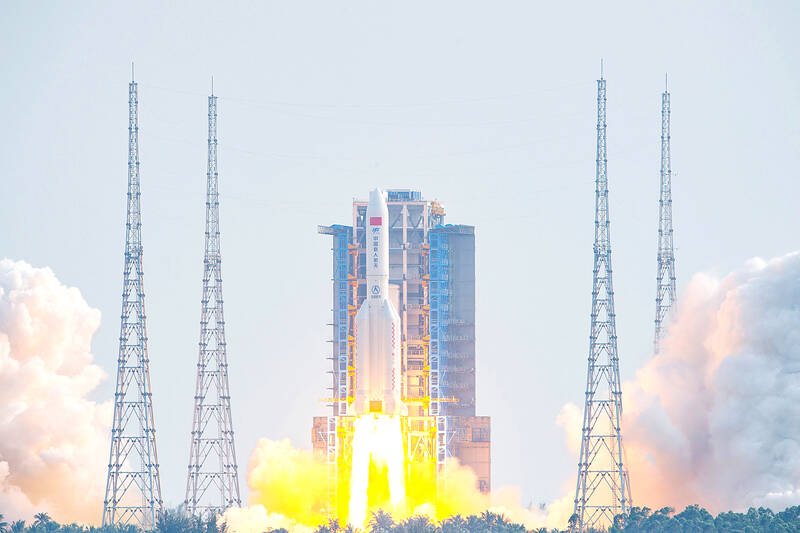China yesterday launched the third and final module to complete its permanent space station, realizing a more than decade-long endeavor to maintain a constant crewed presence in orbit.
Mengtian was blasted into space at 3:39pm from the Wenchang Satellite Launch Center on the southern island province of Hainan.
A large crowd of amateur photographers, space enthusiasts and assorted lookers-on watched the lift-off from an adjoining beach.

Photo: AFP
Many waved Chinese flags and wore T-shirts emblazoned with the characters for China, reflecting the deep national pride invested in the space program and the technological progress it represents.
Mengtian, or “Celestial Dream,” joins Wentian as the second laboratory module for the station, collectively known as Tiangong, or “Celestial Palace.” Both are connected to the Tianhe core module where the crew lives and works.
Like its predecessors, Mengtian was launched aboard a Long March 5B Y4 carrier rocket — a member of China’s most powerful familly of launch vehicles.
It was due to spend 13 hours in flight before reaching Tiangong, which is populated by a crew of two male and one female astronauts, the China Manned Space Agency said.
Chen Dong (陳冬), Cai Xuzhe (蔡旭哲) and Liu Yang (劉洋) arrived in early June for a six-month stay on board, during which they are to complete the station’s assembly, conduct space walks and carry out additional experiments.
Following Mengtian’s arrival, an additional uncrewed Tianzhou cargo craft is due to dock with the station next month, with another crewed mission scheduled for next month, at which time crews might overlap as Tiangong has sufficient room to accommodate six astronauts.
Mengtian weighs in at about 20 tonnes, with a length of 17.9m and a diameter of 4.2m. It is to provide space for science experiments in zero gravity, an airlock for exposure to the vacuum of space and a small robotic arm to support extravehicular payloads.
The already orbiting 23-tonne Wentian laboratory is designed for science and biology experiments, and is heavier than any other single-module spacecraft currently in space.
Next year, China plans to launch the Xuntian space telescope, which, while not a part of Tiangong, is to orbit in sequence with the station and can dock occasionally with it for maintenance.

DOUBLE-MURDER CASE: The officer told the dispatcher he would check the locations of the callers, but instead headed to a pizzeria, remaining there for about an hour A New Jersey officer has been charged with misconduct after prosecutors said he did not quickly respond to and properly investigate reports of a shooting that turned out to be a double murder, instead allegedly stopping at an ATM and pizzeria. Franklin Township Police Sergeant Kevin Bollaro was the on-duty officer on the evening of Aug. 1, when police received 911 calls reporting gunshots and screaming in Pittstown, about 96km from Manhattan in central New Jersey, Hunterdon County Prosecutor Renee Robeson’s office said. However, rather than responding immediately, prosecutors said GPS data and surveillance video showed Bollaro drove about 3km

Tens of thousands of people on Saturday took to the streets of Spain’s eastern city of Valencia to mark the first anniversary of floods that killed 229 people and to denounce the handling of the disaster. Demonstrators, many carrying photos of the victims, called on regional government head Carlos Mazon to resign over what they said was the slow response to one of Europe’s deadliest natural disasters in decades. “People are still really angry,” said Rosa Cerros, a 42-year-old government worker who took part with her husband and two young daughters. “Why weren’t people evacuated? Its incomprehensible,” she said. Mazon’s

‘MOTHER’ OF THAILAND: In her glamorous heyday in the 1960s, former Thai queen Sirikit mingled with US presidents and superstars such as Elvis Presley The year-long funeral ceremony of former Thai queen Sirikit started yesterday, with grieving royalists set to salute the procession bringing her body to lie in state at Bangkok’s Grand Palace. Members of the royal family are venerated in Thailand, treated by many as semi-divine figures, and lavished with glowing media coverage and gold-adorned portraits hanging in public spaces and private homes nationwide. Sirikit, the mother of Thai King Vajiralongkorn and widow of the nation’s longest-reigning monarch, died late on Friday at the age of 93. Black-and-white tributes to the royal matriarch are being beamed onto towering digital advertizing billboards, on

POWER ABUSE WORRY: Some people warned that the broad language of the treaty could lead to overreach by authorities and enable the repression of government critics Countries signed their first UN treaty targeting cybercrime in Hanoi yesterday, despite opposition from an unlikely band of tech companies and rights groups warning of expanded state surveillance. The new global legal framework aims to bolster international cooperation to fight digital crimes, from child pornography to transnational cyberscams and money laundering. More than 60 countries signed the declaration, which means it would go into force once ratified by those states. UN Secretary-General Antonio Guterres described the signing as an “important milestone,” and that it was “only the beginning.” “Every day, sophisticated scams destroy families, steal migrants and drain billions of dollars from our economy...